Experimental Psychology \ 1-1

In this book, concepts that form the basis of cognitive development such as executive functions, memory, perception, intelligence and metacognition are thematically examined and the support of these concepts according to age periods is discussed. The foundations of cognitive development and its relationship with other fields are emphasized theories to explain cognitive development, neurodevelopmental disorders in the context of cognitive development and evaluation of cognitive development are included.

Albert Einstein said, “Learning is experience. Everything else is just information.” His word supported and encouraged me to transform my knowledge into experience, enabling me to understand the importance of experience in the learning processes I have been involved in throughout my life.
At every stage of human life, he learns by experiencing everything and directs his life accordingly. "In this life, the highest and most honorable experience should be to leave artifacts to the world we live in that future generations can benefit from." With that in mind, I decided to write this book.
The purpose of this book; Adhering to the philosophy of "Live to explore, be open to learning!" is to offer the Experiential Learning model that can be a solution to learning, training and development strategies at all stages of life. The basic philosophy in Experiential Learning is that "Learning has no place, time, age, or end, learning can only be done by living". and it will be realized effectively by experience”.
This book; It provides principles for the empowerment of all vital universes in individuals' learning processes with experiential learning methods and gives information and examples on how experiential learning can be applied with curriculum development, individual development, academic research and institutional development programs as well as its contributions to individuals' learning processes.
At every stage of human life, he learns by experiencing everything and directs his life accordingly. "In this life, the highest and most honorable experience should be to leave artifacts to the world we live in that future generations can benefit from." With that in mind, I decided to write this book.
The purpose of this book; Adhering to the philosophy of "Live to explore, be open to learning!" is to offer the Experiential Learning model that can be a solution to learning, training and development strategies at all stages of life. The basic philosophy in Experiential Learning is that "Learning has no place, time, age, or end, learning can only be done by living". and it will be realized effectively by experience”.
This book; It provides principles for the empowerment of all vital universes in individuals' learning processes with experiential learning methods and gives information and examples on how experiential learning can be applied with curriculum development, individual development, academic research and institutional development programs as well as its contributions to individuals' learning processes.
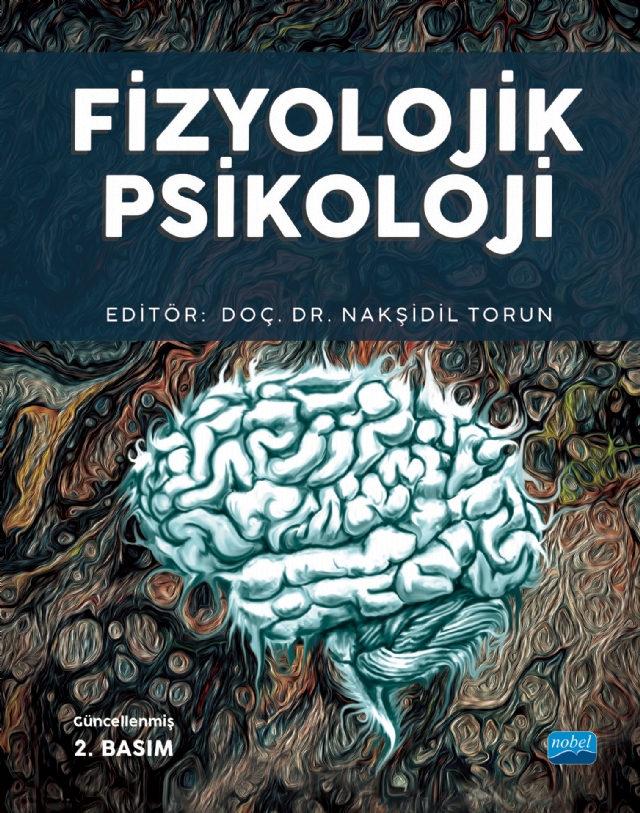
Multidisciplinary research on the biological basis of our behavior is of great interest in our country as well as all over the world. This book, which is an original work in the field of physiological psychology, has been prepared by experts in the field of psychology, neurosciences, physiology, anatomy, neurology, psychiatry, language and speech therapy departments of different universities. In the book, the path from physiological psychology to cognitive neuroscience is genetics, neural transmission, nervous system, brain development, psychopharmacology, visual and non-visual sensory systems, motor system, language, memory, learning, emotions, social cognition, eating-drinking-reproductive behaviors and sleep. topics are covered. In these chapters, firstly, the historical development of the subject is discussed, then the biological mechanisms underlying the behaviors are explained and the subjects are enriched through current studies. In the Physiological Psychology book, which includes the topics at the intersection of physiology, anatomy and psychology, care was taken to include not only Western-based studies but also original studies made in our country. Attention was paid to ensure that the language of the book was fluent, plain and understandable; topics were supported with diagrams, pictures and graphics priority has been given to preparing the chapters in a way that the reader can read with pleasure and easily understand. This book we hope that it will be a resource that will help experts and students working in the fields of psychology, psychological counseling and guidance, psychiatry and neuroscience to discover the biological basis of behavior.

Get ready to journey into the consciousness and quantum universe that will illuminate the reality beyond the rabbit hole. This is such a journey that it tries to open the brain, consciousness, artificial intelligence, quantum computers and many other intriguing topics from the quantum window.
The information in this book; It aims to enter through the window of quantum biology and to open new horizons in our understanding of consciousness and reality. As you witness the quantum universe, where consciousness and the basic building blocks of the universe are used jointly at the center of life, reflecting the same essence, nothing will be the same in your perspective on reality.
The information in this book; It aims to enter through the window of quantum biology and to open new horizons in our understanding of consciousness and reality. As you witness the quantum universe, where consciousness and the basic building blocks of the universe are used jointly at the center of life, reflecting the same essence, nothing will be the same in your perspective on reality.

Life is a learning process. Creatures who realize this know that they have a key role in improving themselves and enriching their lives. Scientists have come up with dozens of theories for learning that can be gained in many different ways. In this book, the nature of learning, its theories and its reflections in practice are discussed from a broad perspective. It is hoped that the book, which was written with the enthusiasm of becoming a cult book in the field of learning psychology, will bring benefits.
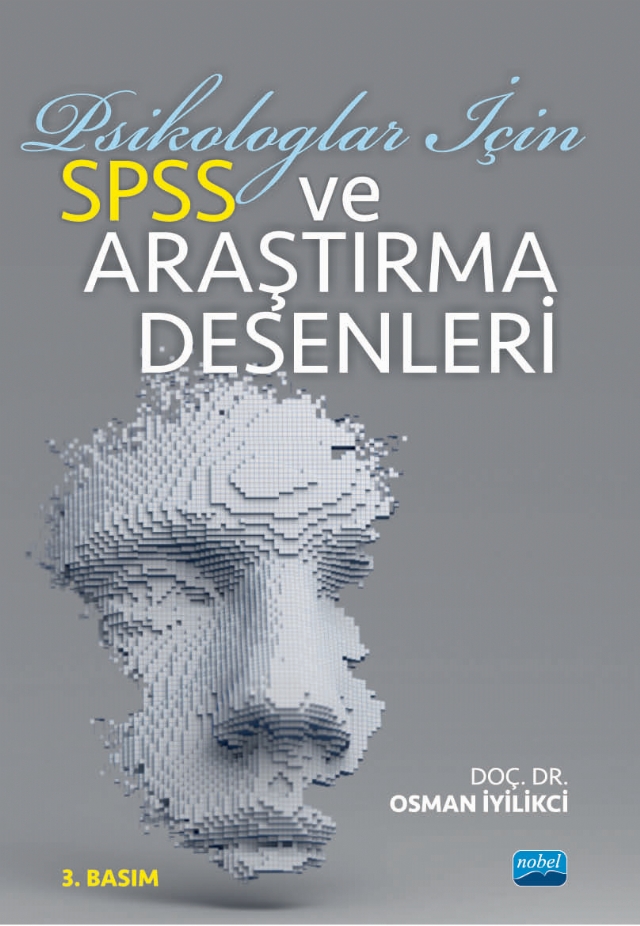
Quantitative data analysis is an important part of scientific research methods in psychology. One of the consequences of this situation is that the research design used during scientific studies in psychology determines which technique will be used to analyze the data obtained. From this point of view, all statistical analyzes in this book are handled together with the research design and measurement level they are related to.
The research examples and the topics covered in the book have been determined in accordance with the terminology that psychologists encounter in research methods, statistics and experimental psychology courses throughout their education. In order to increase clarity, the statistical analyzes in the book are handled through sample data files that the reader can download from the relevant web page. In addition, each analysis is supported by an example of an APA style report.
Considering the topics it covers, it is thought that the book is suitable both for those who are just starting to use SPSS and for researchers with SPSS experience. Therefore, the book is a helpful resource for both students and researchers in scientific research projects, research methods courses, and computer-applied statistics courses.
The research examples and the topics covered in the book have been determined in accordance with the terminology that psychologists encounter in research methods, statistics and experimental psychology courses throughout their education. In order to increase clarity, the statistical analyzes in the book are handled through sample data files that the reader can download from the relevant web page. In addition, each analysis is supported by an example of an APA style report.
Considering the topics it covers, it is thought that the book is suitable both for those who are just starting to use SPSS and for researchers with SPSS experience. Therefore, the book is a helpful resource for both students and researchers in scientific research projects, research methods courses, and computer-applied statistics courses.

"This book; It consists of studies that uniquely address issues that have emerged as a result of several centuries of theoretical and empirical discoveries, contradictions and even tides in the history of psychology. The articles in the book show how wide the conceptualization level of psychology is, from the gene/environment interaction that largely determines our lives to the perception in the social environment. In addition, the book covers techniques ranging from animal models to MRI and EEG, and explains how and why psychology research has benefited from these methods. Apart from this scope and original content, another aspect that makes this book valuable is that it is in Turkish. Unfortunately, the dominance of English and its universality as the language of science brings with it the publication and dissemination of most of the researches in this language. Although the existence and prevalence of a lingua franca is important because it enables all scientists in the world to agree with each other, it is obvious that Turkish must be a scientific language and a means of communication. For this reason, I hope that this book will be an encouraging factor for young scientists to bring their ideas and products into our language.”
Reşit Canbeyli
Bogazici University
Reşit Canbeyli
Bogazici University
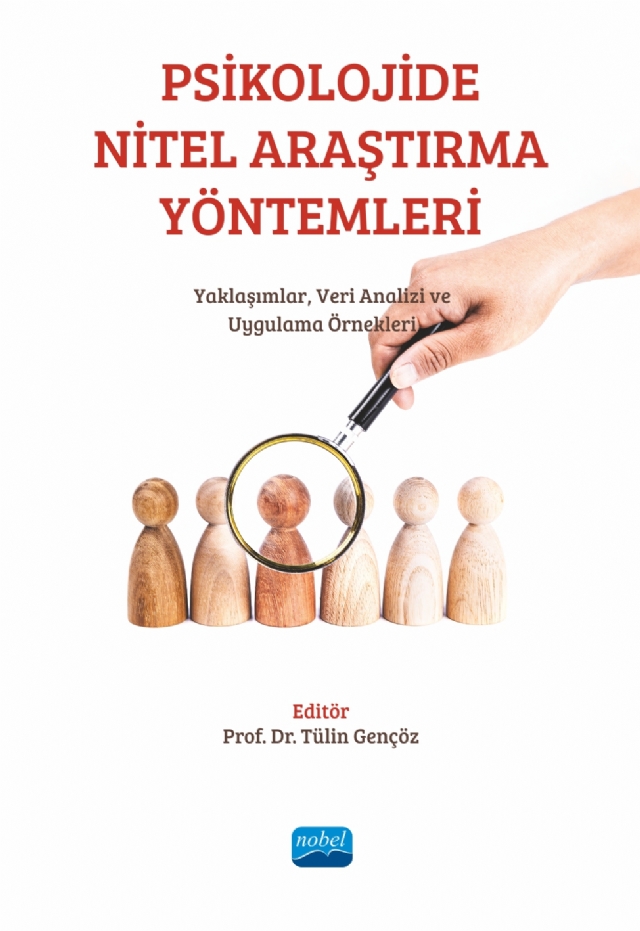
Social science studies, whose focus is human, focus on how individuals make sense of events, interpret them and how they are affected by them. Qualitative research methods are one of the most effective ways to study this subject in depth.
Qualitative research methods are very important scientific research methods that have been preferred more frequently by researchers in recent times, both in terms of working directly with the person in their own language and not denying the potential effect of the researcher on the process. In qualitative studies, the goal is not to determine the truth or falsity of predetermined hypotheses, but to gather in-depth information about why and how experiences affect individuals. Within the framework of this basic stance, qualitative research has different methods, and each method has its own goal and analysis methodology. In this book, these methods are presented to the reader in detail in different chapters, by dealing with all the subtleties within the framework of both the purpose of the research and the ways to be followed according to the method used, and exemplified within the framework of studies in the field of psychology.
Qualitative research methods are very important scientific research methods that have been preferred more frequently by researchers in recent times, both in terms of working directly with the person in their own language and not denying the potential effect of the researcher on the process. In qualitative studies, the goal is not to determine the truth or falsity of predetermined hypotheses, but to gather in-depth information about why and how experiences affect individuals. Within the framework of this basic stance, qualitative research has different methods, and each method has its own goal and analysis methodology. In this book, these methods are presented to the reader in detail in different chapters, by dealing with all the subtleties within the framework of both the purpose of the research and the ways to be followed according to the method used, and exemplified within the framework of studies in the field of psychology.
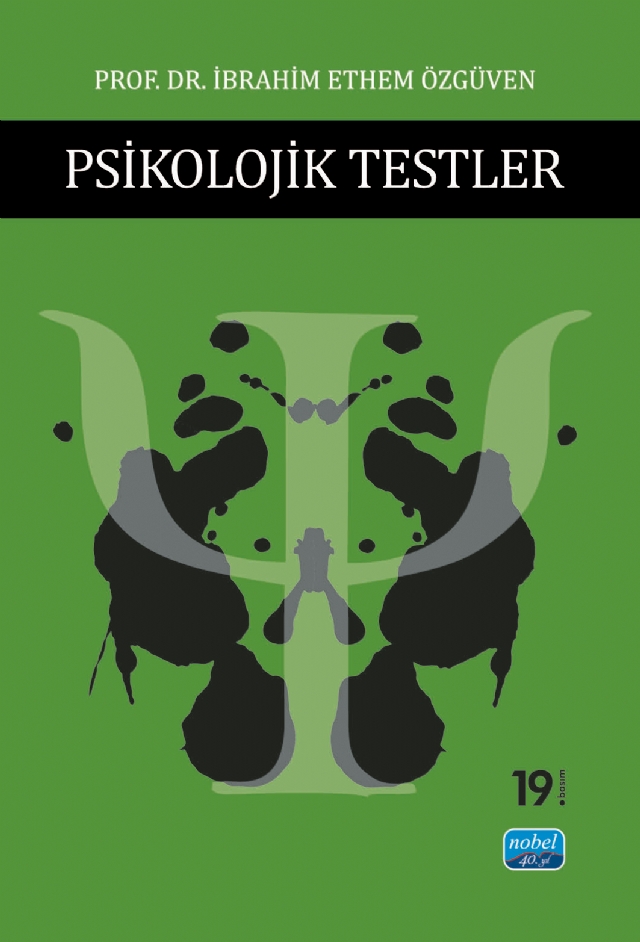
Parallel to the developments in the world, "psychological tests" in our country started as a "translation" movement of tests developed in other countries at the beginning of the current century, and there was no development effort and effort on the tests. In today's sense, writing, testing, applying, doing item analysis, choosing good questions and preparing the posttest, and conducting validity and reliability studies started in the mid-1950s. In the period since the 1950s, important institutions have been established in the fields of measurement technique, psychological tests and test development in our country.
Increasing demand for tests; It has enabled the rapid development of psychology and the branch of psychological tests in our country compared to other branches. Psychological Tests book; He focused on "test development", "appropriate use of psychological tests and appropriate interpretation of the obtained scores", "introducing psychological tests, especially those found in our country".
This book is about psychological tests in undergraduate and partially graduate programs applied in psychology, psychological counseling, psychiatry, assessment and evaluation, program development, child development and education, vocational and technical education, special education, classroom teaching, social services and other related departments of universities. It has been prepared as a “textbook” that can be read.
Increasing demand for tests; It has enabled the rapid development of psychology and the branch of psychological tests in our country compared to other branches. Psychological Tests book; He focused on "test development", "appropriate use of psychological tests and appropriate interpretation of the obtained scores", "introducing psychological tests, especially those found in our country".
This book is about psychological tests in undergraduate and partially graduate programs applied in psychology, psychological counseling, psychiatry, assessment and evaluation, program development, child development and education, vocational and technical education, special education, classroom teaching, social services and other related departments of universities. It has been prepared as a “textbook” that can be read.
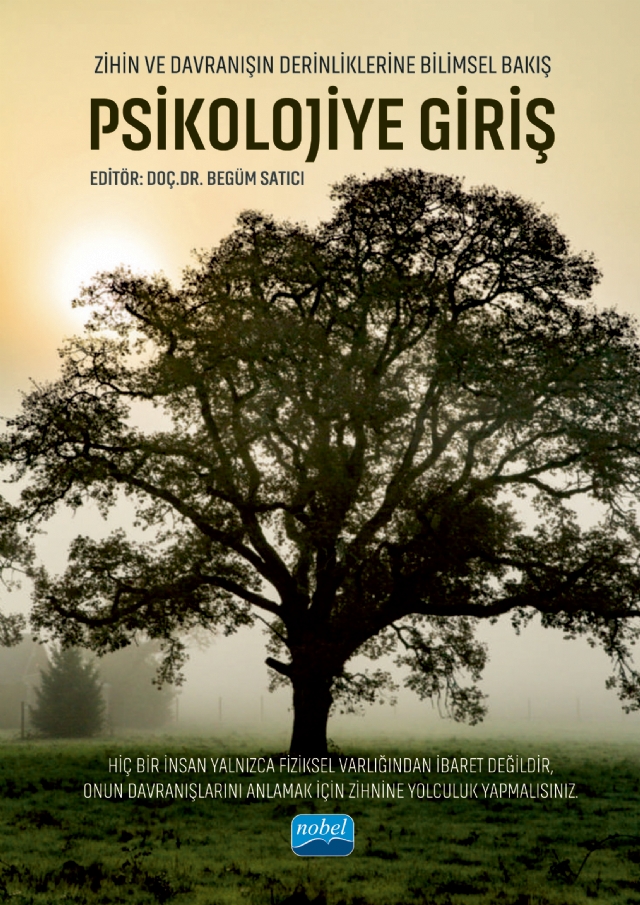
Since you have started to read this book, we can assume that you have an interest and curiosity in psychology. Psychology attracts the attention of almost everyone at some point because it tries to explain the "me" as a human being. Some want to understand themselves, some their partner, their boss, some their children and some their parents. In other words, the effort to understand people and ourselves in the first place leads us to learn psychology. As in the verses of the famous folk poet of Anatolia, Yunus Emre, which are rosewood in our language, "Science is knowledge, knowledge is knowing yourself, if you do not know yourself, it is a lot of reading".
However, this self-knowledge, self-learning, self-discovery can often turn into a toy in the hands of those who turn science into a profit for their own interests. As a matter of fact, not understanding psychology correctly "Are you reading my mind now?" It may also cause you to become the target of the question. “I am also interested in psychology.”, “We also understand psychology, I love personal development books.” Such sentences will be some of the things that those who will specialize in this field will often hear. So, is psychology really a field that anyone who is interested in can specialize in by reading a few books? I can imagine that you answered “no” to this question. Still, it can be equally dangerous to popularize psychology too much and push it away from science, leaving it only in the hands of scientists and making it elitist. Because science will only be useful as long as it reaches people and continues to develop like a living organism in life.
The science of psychology was shaped centuries ago by the answers given by philosophers to the questions they asked to understand human, and then it was born as a science on the basis of physiological studies. Psychology continues to keep our curiosity alive today, with hundreds of theories and millions of concepts written about it.
However, this self-knowledge, self-learning, self-discovery can often turn into a toy in the hands of those who turn science into a profit for their own interests. As a matter of fact, not understanding psychology correctly "Are you reading my mind now?" It may also cause you to become the target of the question. “I am also interested in psychology.”, “We also understand psychology, I love personal development books.” Such sentences will be some of the things that those who will specialize in this field will often hear. So, is psychology really a field that anyone who is interested in can specialize in by reading a few books? I can imagine that you answered “no” to this question. Still, it can be equally dangerous to popularize psychology too much and push it away from science, leaving it only in the hands of scientists and making it elitist. Because science will only be useful as long as it reaches people and continues to develop like a living organism in life.
The science of psychology was shaped centuries ago by the answers given by philosophers to the questions they asked to understand human, and then it was born as a science on the basis of physiological studies. Psychology continues to keep our curiosity alive today, with hundreds of theories and millions of concepts written about it.

TAKE CARE OF YOUR BRAIN. BE YOUR OWN CURE.
Cognitive decline can mean many things and it can take on many shapes. Most of us, for instance, are at least vaguely familiar with diseases such as dementia. The effects and consequences of these diseases have already been heavily codified in our collective consciousness. We see it in movies. Maybe we've heard about it from our friends and relatives. Some of us may even have direct experience caring for a loved one suffering from the effects of dementia. But regardless of whether or not we've had direct experience with someone with cognitive impairment, we know that it can wreak havoc on not just the individuals, but also their families and communities.
However, cognitive decline can also mean something much less drastic. It can look like something as innocuous as forgetting certain words, or names, or places, or dates, or forgetting where you put your keys, or what you went to the grocery store for. It can look like depression or withdrawal. It can look like a lack of focus or attention. Whether or not you're concerned about having dementia in the future, the fact of the matter is that, after a certain point in our lives, all of our brains and their cognitive functions are going to get worse. It's just a matter of when and how severe. But there are things we can do to combat this, to stave off the inevitable. By taking control of your lifestyle, you can take control of your cognitive health. You can be your own cure for dementia.
Cognitive decline can mean many things and it can take on many shapes. Most of us, for instance, are at least vaguely familiar with diseases such as dementia. The effects and consequences of these diseases have already been heavily codified in our collective consciousness. We see it in movies. Maybe we've heard about it from our friends and relatives. Some of us may even have direct experience caring for a loved one suffering from the effects of dementia. But regardless of whether or not we've had direct experience with someone with cognitive impairment, we know that it can wreak havoc on not just the individuals, but also their families and communities.
However, cognitive decline can also mean something much less drastic. It can look like something as innocuous as forgetting certain words, or names, or places, or dates, or forgetting where you put your keys, or what you went to the grocery store for. It can look like depression or withdrawal. It can look like a lack of focus or attention. Whether or not you're concerned about having dementia in the future, the fact of the matter is that, after a certain point in our lives, all of our brains and their cognitive functions are going to get worse. It's just a matter of when and how severe. But there are things we can do to combat this, to stave off the inevitable. By taking control of your lifestyle, you can take control of your cognitive health. You can be your own cure for dementia.
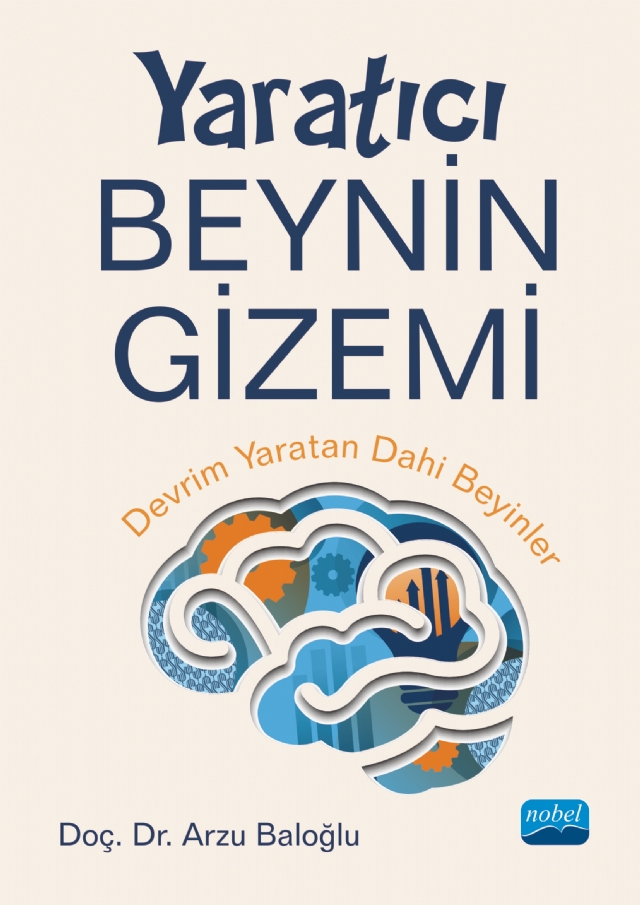
Creative brain is creative thinking towards innovation.
In this book, we will first start with the medical structure and functioning of the brain, and then we will touch on how it works and how it reacts cognitively.
We will analyze issues such as how managers' minds should work, how they should make decisions, and what are the obstacles to correct thinking with examples.
We will continue with the connection of the brain with thought, behavior and happiness.
Then we will consider how we can nurture the mind to develop creative thinking, how the brain can focus on more creative ideas, and what activities will lead the mind to innovative ideas.
Items such as the Brain-Computer interface, the transformation of visual data in the brain into meaningful data with various tools and techniques, data mining, human-machine communication, how the thoughts of individuals with cognitive disabilities can turn into data will also be included as a section.
Finally, we will be researching and interpreting how the brains of world-famous visionaries, entrepreneurs, inventors, business people, revolutionaries and geniuses work, how they manage business, and their behavioral models with examples.
In summary, our aim in this book is to guide the society in activities that develop creative or, if possible, unique thinking, by trying to research and discover the miraculous working system of the brain from an informatics point of view.
In this book, we will first start with the medical structure and functioning of the brain, and then we will touch on how it works and how it reacts cognitively.
We will analyze issues such as how managers' minds should work, how they should make decisions, and what are the obstacles to correct thinking with examples.
We will continue with the connection of the brain with thought, behavior and happiness.
Then we will consider how we can nurture the mind to develop creative thinking, how the brain can focus on more creative ideas, and what activities will lead the mind to innovative ideas.
Items such as the Brain-Computer interface, the transformation of visual data in the brain into meaningful data with various tools and techniques, data mining, human-machine communication, how the thoughts of individuals with cognitive disabilities can turn into data will also be included as a section.
Finally, we will be researching and interpreting how the brains of world-famous visionaries, entrepreneurs, inventors, business people, revolutionaries and geniuses work, how they manage business, and their behavioral models with examples.
In summary, our aim in this book is to guide the society in activities that develop creative or, if possible, unique thinking, by trying to research and discover the miraculous working system of the brain from an informatics point of view.